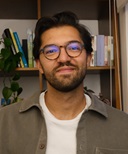Andrés Jácome afj29@cam.ac.uk
Colombia
History, Wolfson College
PhD thesis: New Christians in the Atlantic: Networks, exchanges, and the formation of a cosmopolitan environment
in the seventeenth-century
Research interests:
- Economic and Social History
- Digital Humanities
- Early-Modern Globalisation and Atlantic History
- Social Network Analysis
My research examines a range of New Christian (Jewish converts) networks operating from Cartagena de Indias (Colombia), Lisbon, and Seville to the African cities of Cacheu and Luanda in the seventeenth century. It explains how the social, economic, and cultural practices were transformed within those linkages and interrogates whether these changes formed new “merchant cultures” and cosmopolitan environments in a context that combined such encounters with coercive imperial institutions.
This work builds on recent interpretations of the Early Modern World that emphasise a global and multilateral reading of its social relations, cultural entanglements, and economic dynamics. It moves away from Eurocentric or state-dependent perspectives going beyond traditional religious categories to understand the complex forms of interconnectivity, and the culturally rich scenarios of tolerance and interdependence. Social Network Analysis transforms these relations into graphical representations that portray complex realities that may be rather difficult to observe just by reading the sources.
Who or what inspired you to pursue your research interests?
My research was initially inspired by my undergraduate studies in Colombia, where I became fascinated by how the formation of modern Latin American nations was intricately shaped by sixteenth and seventeenth-century migratory and globalising processes. For my master's thesis in Belgium, I focused on travellers and diasporic movements, particularly in Cartagena de Indias, uncovering their role in shaping encounters, identities, and cultures within the Atlantic framework. Now, my research integrates these elements with Social Network Analysis to trace and interpret multilateral environments in this transnational context, connecting them to other ports, such as those in Western Africa and Europe.

